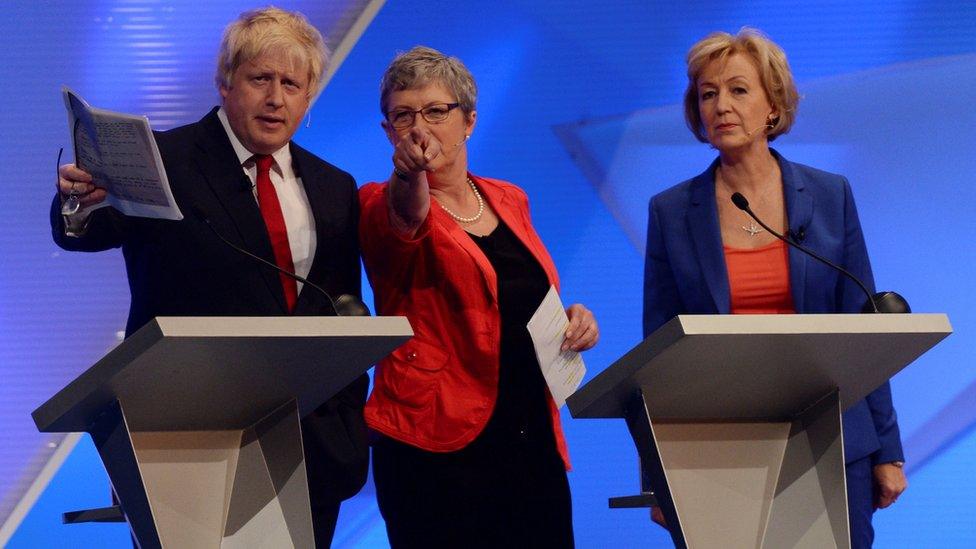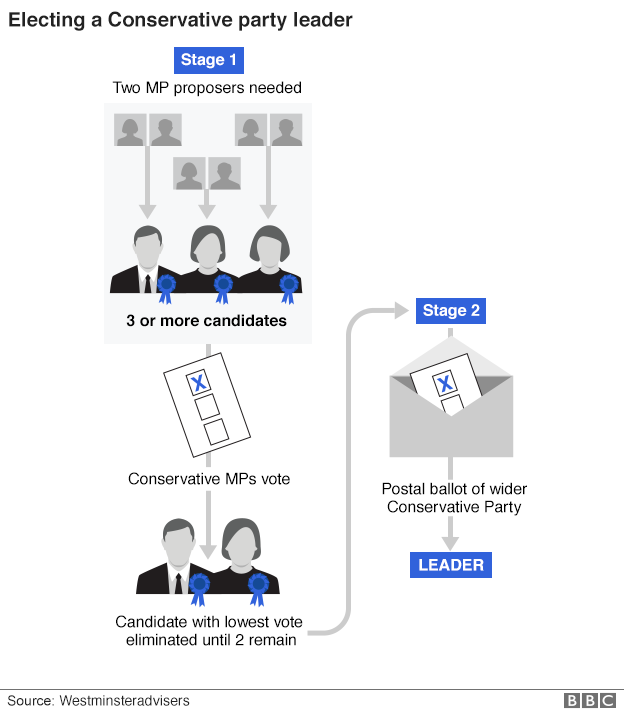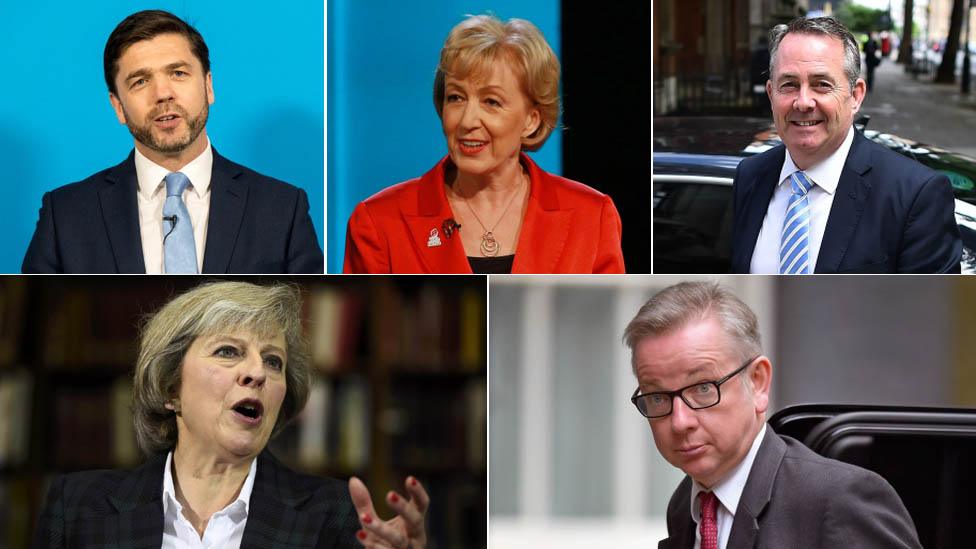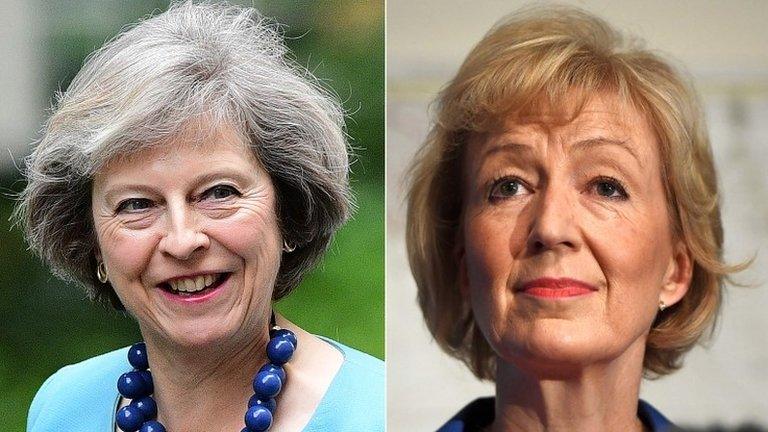Conservative leadership race: First round of voting closes
- Published
- comments
Five candidates are hoping to succeed David Cameron as Tory leader and UK prime minister
Tory MPs' voting has closed in the first round of the contest to replace David Cameron as leader and UK prime minister - with the result due shortly.
Theresa May began the contest with the most number of MPs declaring support.
But energy minister Andrea Leadsom, who won Boris Johnson's backing on Monday, Michael Gove, Stephen Crabb and Liam Fox also hope to succeed David Cameron.
Party members will choose from the two backed by most Tory MPs, with the winner due to be named on 9 September.
The Conservative Party's 330 MPs had between 11:00 and 18:00 BST to cast their votes.
The results are expected within the hour, when the poorest performing candidate will be eliminated.
The vote took place behind closed doors in Parliament's Committee Corridor, with senior Conservative MP Charles Walker overseeing proceedings.
Further rounds of voting will take place on Thursday and the following Tuesday until two candidates remain.
On Monday the candidates were given the chance to make their cases to be the next Conservative leader during a parliamentary hustings.
During the meeting, Mrs May is understood to have repeated her view that the status of EU nationals currently in Britain would form part of negotiations ahead of Britain's withdrawal from the EU.
Mr Gove, Mr Fox, Mrs Leadsom and Mr Crabb, have said EU citizens should have their right to stay in the UK protected.
After the meeting, one Tory MP opposed to Mrs Leadsom's bid to become leader described an attempt to distance herself from UKIP support as a "car crash".
But Boris Johnson insisted she had drive and described her as "kind and trustworthy" as he backed her campaign.

Boris Johnson described Andrea Leadsom (right) as "kind and trustworthy"
The contest has been sparked by Mr Cameron's decision to step down as prime minster after the UK voted by 52% to 48% to leave the EU, in the June referendum.
The PM, who had campaigned strongly for a Remain victory, said "fresh leadership" was required as the UK negotiated its exit from the European Union.
Mr Johnson, the former mayor of London and a leading figure in the Brexit campaign, had been expected to run for the Tory leadership.
But his leadership hopes were dashed after Mr Gove launched his own bid for the job, with a stinging attack on his fellow Leave campaigner.
Mrs May and Mr Fox were the first two leadership candidates to take part in the vote, with Mr Crabb and Mr Gove later posing for separate photos outside the room before entering to cast their votes.

Analysis
By Laura Kuenssberg, BBC political editor
As MPs prepare to vote in the first leadership ballot, Tory minds are starting to focus on what life, post-David Cameron will look like.
The expectation is that the two names on the ballot that goes to Tory party members for the final decision will be Theresa May and Andrea Leadsom.
But despite their victory 10 days ago that will change the country, the Outers are struggling to find a stand-out candidate.
Michael Gove's standing after last week's Machiavellian moves has suffered. Andrea Leadsom has a long way to go to convince MPs and members that she is ready for the job.
Right now it's someone who was on the losing side in the referendum, Theresa May, that is well in front.
But given how quickly things have changed in Westminster in just a few short days, making any predictions is a risky game.

The latest tally of public declarations for each of the leadership contenders shows Mrs May, the home secretary who campaigned to stay in the EU, out in the lead among her colleagues, with 132 MPs' backing.
Among her supporters are former backers of Mr Johnson, including cabinet minister Liz Truss and former shadow home secretary David Davis.
Mrs Leadsom has 42 declared supporters - including Mr Johnson and Northern Ireland Secretary Theresa Villiers.
Mrs May and Mrs Leadsom are followed by Mr Gove, the justice secretary, with 27, Mr Crabb, the work and pensions secretary, on 23 and Mr Fox, a former defence secretary, on nine.
'Tough negotiation'
Mr Crabb told BBC Radio 4's Today programme he would not use EU citizens living in the UK as "negotiating chips" when forging a new post-Brexit deal with the EU, assuring them that they would be allowed to remain - even if other EU countries threatened to remove UK citizens.
He said: "The idea that we will be some kind of Checkpoint Charlie scenario where we're arguing over trading people living in each other's countries - that is not going to happen.
"The new PM needs to be very clear that it's a mark of a decent society that we're not going to make EU citizens who are resident in the UK bring them in as negotiating chips into what will be a very, very tough negotiation."
He said he would not trigger Article 50, the formal mechanism that takes Britain out of the EU, straight away, saying the "dust hasn't really even begun to settle on the kind of political choices that need to get made now following the outcome of the referendum".
Asked about his views on gay marriage Mr Crabb, who had links in the past with a Christian charity that is reported to have advocated psychological therapy for gay people, said it was a complete falsehood to say that he backed "gay cure therapy".
He said despite voting against gay marriage in Parliament he was pleased with the outcome of the vote. He added that he did not believe being gay was a "sin" saying the "idea that being gay is something to be cured that is reprehensible" and "certainly not part of my Christian outlook".

- Published8 July 2016

- Published4 July 2016
- Published8 July 2016
